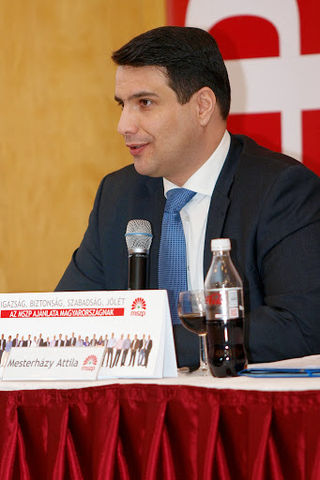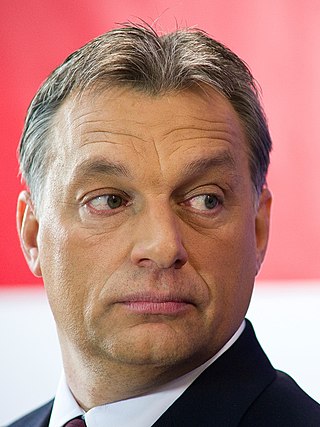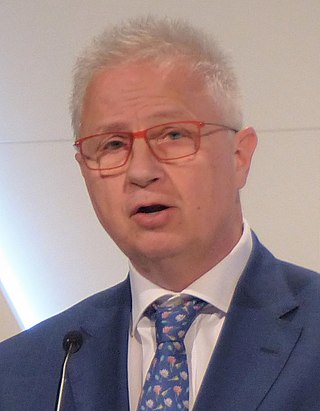
Péter Medgyessy is a retired Hungarian politician who served as Prime Minister of Hungary from 27 May 2002 to 29 September 2004. On 25 August 2004, he resigned over disputes with coalition partner Alliance of Free Democrats, but remained as acting prime minister for a 30-day period as required by the Constitution, and a few additional days until his successor Ferenc Gyurcsány was confirmed by the National Assembly.

The Hungarian Socialist Party, commonly known by its acronym MSZP, is a centre-left to left-wing social-democratic and pro-European political party in Hungary.

The Democratic Coalition is a social-liberal and social-democratic political party in Hungary led by former Prime Minister Ferenc Gyurcsány. Founded in 2010 as a faction within the Hungarian Socialist Party (MSZP), the Democratic Coalition split from the MSZP on 22 October 2011 and became a separate party. It has fifteen MPs in the National Assembly and four MEPs in the European Parliament.

Ferenc Gyurcsány is a Hungarian entrepreneur and politician who served as Prime Minister of Hungary from 2004 to 2009. Prior to that, he held the position of Minister of Youth Affairs and Sports between 2003 and 2004.

The Hungarian Workers' Party is a communist party in Hungary led by Gyula Thürmer. Established after the fall of the communist Hungarian People's Republic, the party has yet to win a seat in the Hungarian parliament. Until May 2009, it was a member of the Party of the European Left. It was formed from, and considers itself the successor to, the former ruling Hungarian Socialist Workers' Party. Despite having run in every parliamentary election since 1990, the party has never won seats.

The Christian Democratic People's Party is a right-wing Christian democratic political party in Hungary. It is officially a coalition partner of the ruling party, Fidesz, but is mostly considered a satellite party of Fidesz. The party has been unable to get into the Parliament on its own since the 1990s, as it was not able to pass the election threshold of 5% of the vote. Without Fidesz, its support is now low enough that it can no longer be measured, and even a leading Fidesz politician, János Lázár, stated that Fidesz does not consider the government to be a coalition government.

Katalin Szili is a Hungarian politician and jurist, a former Member of the National Assembly, who served as Speaker of the National Assembly from 2002 to 2009.

Parliamentary elections were held in Hungary on 9 April 2006, with a second round of voting in 110 of the 176 single-member constituencies on 23 April. The Hungarian Socialist Party (MSZP) emerged as the largest party in the National Assembly with 186 of the 386 seats, and continued the coalition government with the Alliance of Free Democrats (SZDSZ). It marked the first time a government had been re-elected since the end of Communist rule. To date, this is the most recent national election in Hungary not won by Fidesz-KDNP, and the last in which the victorious party did not win a two-thirds supermajority in parliament.

Parliamentary elections were held in Hungary on 10 May 1998, with a second round of voting in 175 of the 176 single member constituencies on 24 May.

Parliamentary elections were held in Hungary on 25 March 1990, with a second round of voting taking place in all but five single member constituencies on 8 April. They were the first completely free and competitive elections to be held in the country since 1945, and only the second completely free elections with universal suffrage in the country's history. The conservative, nationalist Hungarian Democratic Forum (MDF) beat the liberal and more internationalist Alliance of Free Democrats, which had spearheaded opposition to Communist rule in 1989, to become the largest party in parliament. The Hungarian Socialist Party, the former Communist party, suffered a crushing defeat, winning only 33 seats for fourth place.

A referendum on revoking some medical and tuition fees was held in Hungary on 9 March 2008. The proposals would cancel government reforms which introduced doctor visit fees paid per visitation and medical fees paid per number of days spent in hospital as well as tuition fees in higher education. All three were supported by a majority of voters. Prime Minister Ferenc Gyurcsány stated that the fees would be abolished on 1 April 2008 following the referendum, but that the government had no funds available to replace the income lost for the higher educations institutions and health institutions due to the abolishment of the fees.

LMP – Hungary's Green Party is a green-liberal political party in Hungary. Founded in 2009, it was one of four parties to win seats in the National Assembly in the 2010 parliamentary election. It is a member of the Global Greens, and suspended member of the European Green Party.

Attila Mesterházy is a Hungarian politician, who served as the seventh chairman of the Hungarian Socialist Party (MSZP) from 10 July 2010 to 29 May 2014. He was a Member of Parliament between 2004 and 2022. He was the party's candidate for the position of Prime Minister of Hungary in the 2010 and 2014 parliamentary elections.
Local elections took place in Hungary on 1 October 2006 amidst a period of protests and demonstrations against the government of Prime Minister Ferenc Gyurcsány. In many cities, demonstrators urged people not to vote for the MSZP candidate at the elections, and Fidesz made heavy use of the fact that Gyurcsány had admitted lying in its campaign leaflets and phone calls.

An election of Members of the European Parliament from Hungary to the European Parliament was held on 25 May 2014.
The Agrarian Alliance – National Agrarian Party was a political party in Hungary.

Parliamentary elections were held in Hungary on 6 April 2014. This parliamentary election was the 7th since the 1990 first multi-party election. The result was a victory for the Fidesz–KDNP alliance, preserving its two-thirds majority, with Viktor Orbán remaining Prime Minister. It was the first election under the new Constitution of Hungary which came into force on 1 January 2012. The new electoral law also entered into force that day. For the first time since Hungary's transition to democracy, the election had a single round. The voters elected 199 MPs instead of the previous 386 lawmakers.

Parliamentary elections were held in Hungary on 8 April 2018. The elections were the second since the adoption of a new constitution, which came into force on 1 January 2012. The result was a victory for the Fidesz–KDNP alliance, preserving its two-thirds majority, with Viktor Orbán remaining Prime Minister. Orbán and Fidesz campaigned primarily on the issues of immigration and foreign meddling, and the election was seen as a victory for right-wing populism in Europe.

Parliamentary elections were held in Hungary on 3 April 2022 to elect the National Assembly, coinciding with a referendum. Hungary's incumbent prime minister Viktor Orbán won re-election to a fourth term. Addressing his supporters after the partial results showed Fidesz leading by a wide margin, Orbán said: "We won a victory so big that you can see it from the moon, and you can certainly see it from Brussels." Opposition leader Péter Márki-Zay admitted defeat shortly after Orbán's speech. Reuters described it as a "crushing victory".

An election of Members of the European Parliament from Hungary to the European Parliament was held on 26 May 2019, electing the 21 members of the Hungary delegation to the European Parliament as part of the European elections held across the European Union.





















